KEY TAKEAWAYS
- The HIMALAYA phase 3 trial aimed to assess outcomes in patients with cardiovascular or metabolic CMs.
- Patients with CMs benefited similarly from STRIDE, confirming its long-term efficacy and safety profile.
The 4-year HIMALAYA analysis revealed that STRIDE (Single T Regular Interval D) maintained an overall survival (OS) advantage over sorafenib (S) and showed further improvement in patients achieving disease control (Sangro et al., Ann Oncol 2024). Cardiovascular (CV) and metabolic (MB) comorbidities (CMs) are common in individuals with hepatocellular carcinoma (HCC) and can influence treatment options and outcomes.
Lorenza Rimassa and colleagues aimed to evaluate the outcomes of patients with CV or MB CMs in the HIMALAYA study.
Patients’ CMs were based on medical history at baseline and classified using preferred terms from CV or MB SMQs. Patients with multiple CMs were counted once. The study evaluated OS by CMs iin the full analysis set (FAS) of patients randomized to STRIDE, D, or S, including long-term survivors (LTS; alive ≥36 months post-randomization).
They estimated OS HRs and 95% CIs through unstratified Cox models. Safety was assessed in patients who received at least 1 dose of the study drug using the safety analysis set (SAS). The data cut-off was January 23, 2023.
The results showed that in FAS, hypertension (HT) was the most common CV CM (STRIDE, 212 [54%]; D, 163 [42%]; S, 197 [51%]) and type 2 diabetes (T2DM) was the most common MB CM (STRIDE, 141 [36%]; D, 104 [27%]; S, 110 [28%]).
In the Stride arm, OS HRs for patients with vs. without CMs were 0.86 (95% CI: 0.68-1.08) for CV and 1.16 (95% CI: 0.92-1.47) for MB. STRIDE showed higher 36—and 48-month OS rates compared to S in patients with CMs. Serious treatment-related adverse events (TRAEs) were similar for patients with CMs (21%) and all patients in the SAS (18%).
The study concluded that patients with CMs experienced similar OS benefits from STRIDE as those without, with no new safety signals observed. This supports STRIDE’s long-term benefits in a broad population with uHCC globally.
The trial was sponsored by AstraZeneca.
Source: https://cslide.ctimeetingtech.com/esmogi24hybrid/attendee/confcal/show/session/3
Clinical Trial: https://www.clinicaltrials.gov/study/NCT03298451
Rimassa L, Dayyani F, Kelley RK, et al. (2024). “Outcomes by comorbidities (CMs) with tremelimumab (T) and durvalumab (D) in the phase III HIMALAYA study in unresectable hepatocellular carcinoma (uHCC).” Presented at ESMO GI 2024. (Abstract 169P)



